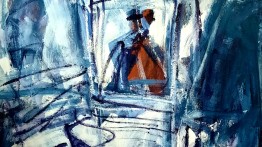Introduction to Painting with Acrylics
Cost: $630.00
6 In-Person Sessions
Sundays, February 23–March 30, 2025
12:30 PM–4:30 PM
Registration opens January 2, 2025
REGISTER ONLINE
In this course, you will learn the fundamentals of working with acrylic paint, a water-based medium that provides a versatile, economical, and non-toxic contemporary alternative to traditional oil painting. With a focus on working from observation and through a combination of didactics, technical demonstrations, focused painting projects, and hands-on instruction, you will become familiar with the materials and techniques of acrylic painting and develop skills that will enable you to progress from the study of basic principles to the creation of more advanced work in which you can apply your knowledge of the medium to pursue your creative vision.
In your classes, you will produce several paintings in specific areas of concentration—ranging from studies of tonal and color relationships to quick sketches, to more finished, “final” pieces that synthesize and showcase what you have learned. Subjects will range from basic still-lives that emphasize fundamentals to more sophisticated work from the human figure (using a live model), culminating in the creation of a more independent, synthetic composition that combines elements of the different material approaches you have been practicing.
The class will take place in a large, skylit studio equipped with easels and painting tables for individual students.
Each session will begin with a brief didactic presentation, followed by ample studio time to allow you to apply the techniques you are learning to your paintings, with hands-on supervision as needed or requested.
This course is intended for students at the beginning-to-intermediate level, as it will cover the basics of painting with acrylics. Some background or education in drawing, while not required, is strongly recommended, since this class will focus on observational painting.
Please bring a smock, apron or wear clothes that you don't mind getting paint on to class.
Required Materials:
All items can be purchased from www.dickblick.com, or at a Blick store
Paints (250 mL Blick Studio Acrylics, one or more of each)
- Titanium White
- Primary Yellow
- Cadmium Red Light Hue
- Alizarin Crimson
- Phthalo Blue or Cerulean Blue Hue
- Ultramarine Blue
- Burnt Umber
- Yellow Ochre
- Red Oxide
- Optional: Dioxazine Purple/Violet, Emerald Green
Brushes
- Utrecht Natural Chungking Pure Bristle Brushes, Long Handle set of 4, or assorted brushes of your choice
- Gesso Brush
Painting Surfaces
- Canson XL oil and acrylic painting pad
- Painter’s Tape
- 1 or more Blick studio stretched cotton canvas in the following sizes: 11 x 14, 18 x 24, 30 x 40 inches
Painting Tools and Accessories
- Painting Palette. Richeson Grey Matters or Canson XL Paper Palette recommended
- Blick Palette Knife
- Artist’s Acrylic Gesso, Utrecht or Blick, Pint or larger
- Several Plastic Cups or Container
- A portfolio and/or a bag(s) to carry materials and paintings, no painting storage is available on campus
Course Code: ACRSP23
Instructor(s): David Derish







